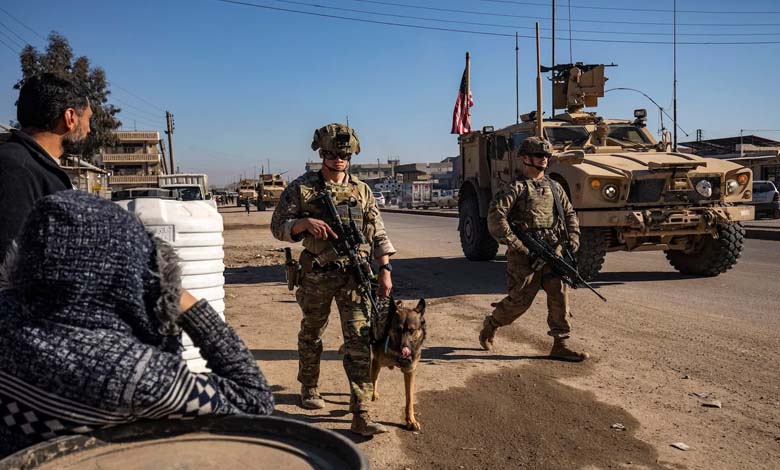Washington evacuates its nationals from the Middle East in preparation for any emergency

Trump: Iran must not possess a nuclear weapon… We’ll see what happens
On Wednesday, U.S. President Donald Trump announced that American citizens would be evacuated from the Middle East, stating the region “could be a dangerous place,” while reiterating that the United States would not allow Iran to acquire a nuclear weapon—a stark warning that hints at the potential for a military strike on Tehran’s nuclear program.
-
The Week of Reckoning in America… Trump’s Loyalty Philosophy under Scrutiny
-
The Future of Dominance: How Military Realignment Enhances America’s Power
Earlier on Wednesday, U.S. and Iraqi media reported that the U.S. was preparing for a partial evacuation of its embassy in Baghdad and would allow military families to leave parts of the Middle East due to increasing security threats. Four American sources and two Iraqi sources did not disclose the exact nature of the threats. Following the news, oil prices surged by over 4%.
A U.S. official confirmed the State Department had authorized voluntary departures from Bahrain and Kuwait. That evening, the department updated its global travel advisories, citing “increased regional tensions” as the reason for the departure order of non-essential staff.
-
Security Classification and Travel Restrictions: The U.S. Rewrites Its Global Relations
-
The Writers of the “State of the Union” Address… A Grueling Task for the President’s “Mirror”
The decision comes amid stalled diplomatic efforts between Washington and Tehran to revive nuclear talks. U.S. intelligence reportedly suggests that Israel is preparing to strike Iranian nuclear facilities.
Speaking to reporters, Trump said: “We’re moving them out because the region could be dangerous. We’ll see what happens.”
Asked if anything could be done to de-escalate tensions, he replied: “They cannot have a nuclear weapon. Plain and simple. They cannot. We’ll see what happens.”
Trump has repeatedly threatened to strike Iran if negotiations fail, and on Wednesday admitted his confidence in Tehran’s willingness to halt uranium enrichment—a key U.S. demand—was fading.
-
“Zero Hour” Nuclear Crisis: Where Would the U.S. President Hide?
-
8 Facts Explaining the History of the “State of the Union” Address in the United States
Earlier that day, Iranian Defense Minister Aziz Nasir Zadeh warned that Tehran would attack U.S. bases in the region if Iran were struck.
Still, the situation remains mixed. The U.S. embassy in Kuwait announced that its operations continue at full capacity. The U.S. maintains a significant military presence in Iraq, Kuwait, Qatar, Bahrain, and the UAE.
Another official stated that Defense Secretary Pete Hegseth had authorized voluntary departures for military families, particularly in Bahrain where most are stationed.
-
Who is the President: Trump or Musk? A Newspaper Unveils a Surprise
-
“Hellfire” on Board: A New U.S. Tactic to Counter Drones
A third official said the State Department plans an orderly evacuation of its embassy in Baghdad, primarily using commercial transport, though the U.S. military stands ready to assist if requested.
According to Iraq’s official news agency, the Iraqi government said no major security events warranting an evacuation had been observed.
The Associated Press reported that the State Department had also authorized non-essential staff and families to leave from Kuwait and Bahrain.
-
The Muslim Brotherhood in the U.S. Under Pressure… What’s Happening?
-
Musk’s Authority Raises Americans’ Concerns of a State within a State
Another official confirmed there were no changes at Al-Udeid Air Base in Qatar—the largest U.S. military base in the region—and that the U.S. embassy in Doha continued to operate normally.
Oil futures jumped by about $3 following the evacuation news, with Brent crude reaching $69.18 per barrel.
The UK Maritime Trade Operations (UKMTO) warned earlier that rising tensions in the Middle East could escalate military activity and impact shipping in key waterways, advising vessels to exercise caution in the Gulf, Gulf of Oman, and Strait of Hormuz.
The British Foreign Office said it is monitoring the situation and will continually reassess its embassy status in Iraq.
Iraq, a rare regional partner to both the U.S. and Iran, hosts approximately 2,500 American troops. Several Iran-backed armed groups are also integrated into Iraq’s security forces.
Tensions have escalated in Iraq since the outbreak of war in Gaza in October 2023, with Iran-aligned groups launching repeated attacks on U.S. forces—though such attacks have decreased recently.
-
Why Will Conspiracy Theories About the “CIA” Not Disappear?
-
The Pentagon is “powerless” against mysterious drones… Unchecked intrusions over a U.S. base
Last year, Israel and Iran exchanged direct fire for the first time, with missiles and drones flying over Iraqi airspace.
Israel, the United States’ key regional ally, has struck Iran-linked targets throughout the region, including Iraqi militias operating from Iraq and Syria.
In recent months, the U.S. has ramped up its military presence in the Middle East, including deploying B-2 bombers and an additional aircraft carrier, which has since departed.
The next round of nuclear talks between Iran and the U.S. is scheduled in the coming days, with expectations that Iran may present a counter-proposal after rejecting a recent American offer.
-
America Approves Two Arms Deals for the UAE and Saudi Arabia
-
“Drone” and American Forces: Behind the Attack on “Kharab al-Jabir” in Syria
A senior Iranian official stated that military threats have always been part of the U.S.’s negotiation tactics with Iran. “Any military action—whether by the U.S. or Israel—will carry grave consequences,” he warned.
Iran’s mission to the United Nations posted on X: “Threats of ‘overwhelming force’ will not change the facts. Iran does not seek nuclear weapons. American militarism only fuels instability.”
This appeared to respond to remarks by U.S. Central Command Chief General Michael Kurilla, who said he had presented President Biden with “a wide range of options” to prevent Iran from acquiring nuclear weapons.
Two other American officials said Kurilla had postponed a scheduled testimony before Congress on Thursday due to rising tensions in the Middle East.












